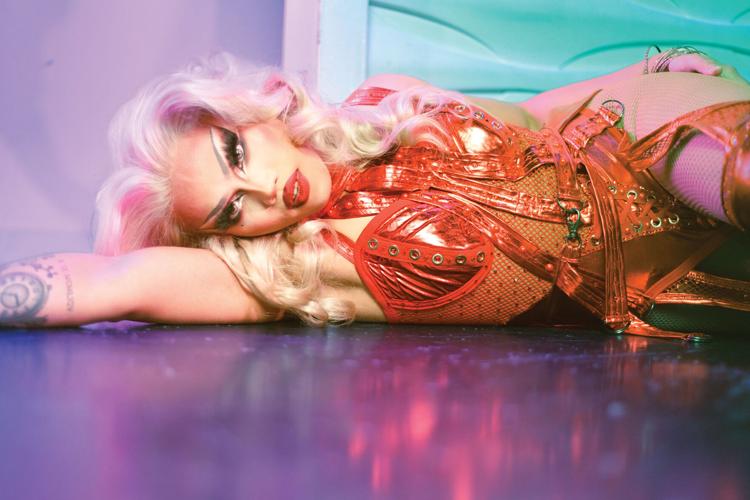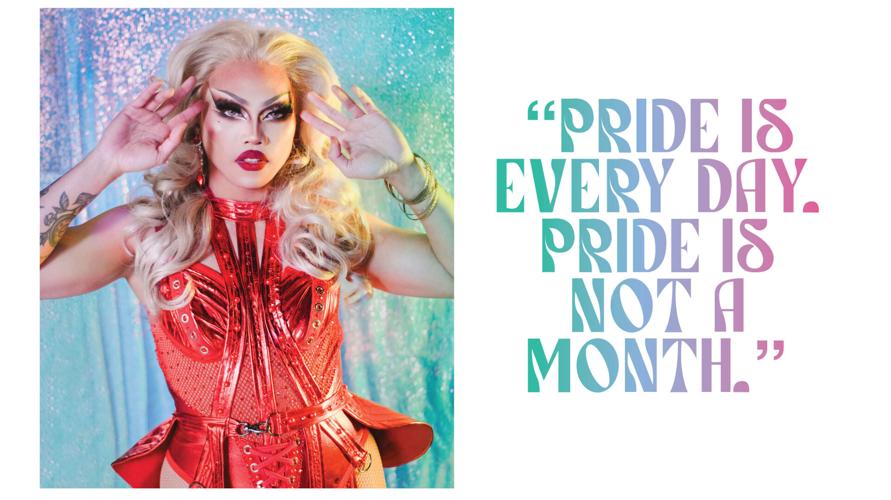It’s the Friday before Memorial Day when I arrive at Play. I’ve been to countless shows at Play, so it’s odd to be there in daylight. Aura Mayari rushes out to greet me from backstage in full makeup and hair, wearing a T-shirt and shorts. She may be in half-drag, but she is fully gorgeous.
Maybe you’ve heard of Mayari. She appeared on a little television show called RuPaul’s Drag Race, which has won 26 Emmy Awards.
Racers, start your engines.
Originally from the Philippines, Mayari got her drag start in Chicago when she was cast as Angel in a local production of Rent. Depressed working an office job, she started practicing makeup and performance. Monday to Friday, she was at the office. But at night, she was doing drag.
“When I was younger, I thought I was going to be an entertainer,” Mayari says. “Somebody who was going to be a leader or a representation for something.”
Mayari and her partner moved to Nashville during the pandemic. “Play realized that I moved here and contacted me,” Mayari says. “They were so good at selling, and they booked me multiple times. I liked the feeling of that. It felt different. I felt alive.”
Four months later, Drag Race auditions were announced. Mayari auditioned and was cast as a contestant on the 15th season.
“Oh, my goodness — the first day, I was shitting my pants,” says Mayari. “I can swear, right?”
During a Zoom interview a few days before her photo shoot at Play, Mayari has just gotten home from the gym. She’s wearing a T-shirt and a backward baseball hat. When she’s out of drag, you notice how warm her eyes are, how much she lights up when talking about drag and how quick she is to laugh. She’s an animated storyteller, and every time she gestures, I catch glimpses of the tattoos covering her forearms. “So RuPaul walked in. I was like, ‘Holy shit, this person is so fucking tall.’ I’ve never been starstruck. I was intimidated. It was an out-of-body experience.”
Being present was the hardest part of Drag Race for Mayari. Contestants are isolated and away from their families. Not being able to talk to them is difficult — it’s not something you can mentally prepare for.
Mayari sashayed away in the seventh episode. She was relieved to go home and see her partner, but critical of herself for not making it further. After some time, Mayari came to feel pride — pride in what she did and confidence that she was enough.
Pride is important to Mayari because self-acceptance didn’t come easily. In addition to being Asian American and what Mayari calls “a minority, as well as a minority in the minority,” she had to learn how to accept herself. Like so many things, it’s a journey, and one she wouldn’t change for anything.

Aura Mayari
Knowing how important it is to grow up seeing yourself represented on TV, Mayari appreciates the Drag Race platform allowing her to be the representation a lot of kids need.
“We don’t belong in the closet,” Mayari says. “We’re real people.”
All over the country, the LGBTQ community is under attack. In Tennessee, the trans and drag communities have found themselves targets of hateful, discriminatory legislation. Earlier this month, a federal judge in Shelby County ruled Tennessee’s drag ban unconstitutional and halted its enforcement.
“It’s not just that they’re restricting drag performers,” Mayari says. “It teaches other communities that don’t know anything about us that we are a menace to society. We feel that. Even if you’re not involved in the drag scene. Just being a gay person, you feel that sense of being targeted.”
In addition to performing drag, Mayari is making music, a longtime dream of hers. She’s working with an L.A.-based music producer, has sent in a demo and is trying to find time to record. Her latest is an upbeat dance-pop song. She sees it as a gift to her drag sisters, because of the hate and bullying they’ve experienced online.
“Pride is every day,” she says. “Pride is not a month. You should always have pride for yourself. Be brighter than the colors of the rainbow and whatever people throw at us. We have a great and brave community to stand behind you.”
Plus we chat with hometown queen Aura Mayari and delve into the history of Play





